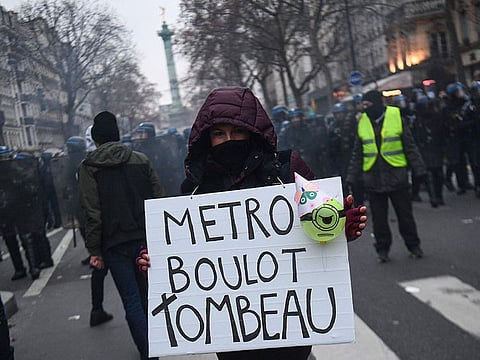France hit by disruptions as unions protest Macron pension plan
Railways, Paris metro, schools and hospitals are all disrupted

Strikes coordinated by French unions brought significant disruption to the country on Thursday as they protested against government plans to revamp the pension system and tested President Emmanuel Macron's ability to resist street pressure.
Workers in sectors including railways, schools and energy took part in the 24-hour strike against Macron's plan to raise France's minimum retirement age to 64 from 62. Unions led marches across France's largest cities with the backing of left-wing political parties.
In a rare show of unity, France's eight largest labor unions coordinated efforts and the disruptions prompted the government to urge people to work from home. The CGT union set a goal of having at least 1 million people protest across France. According to interior ministry figures, which are usually lower than union estimates, around 1.1 million people demonstrated on Thursday.
"You never really know what the outcome of such a movement will be," said Julien Rivoire, a 44-year-old teacher speaking as he marched in Paris. Still, he said he was optimistic that the government might back down. "The overwhelming majority of the public opinion is against the reform and the government is weak and nervous."
Macron's decision to forge ahead with his reform comes at a difficult juncture for the French economy as it wrestles with power prices that soared last year and as inflation weighs on households and businesses. In an effort to build consensus, Macron has set the proposed minimum retirement age at 64, down from an initial plan to put it at 65, and government ministers have said that they are open to tweaks to the plan during parliamentary debates.
It's "above all a fair and responsible reform," Macron said at a press conference in Barcelona after meeting with Spanish Prime Minister Pedro Sanchez.
Some of Thursday's largest disruptions were in transportation. Most high speed trains were canceled and an even smaller fraction of regional trains were in service. In Paris, most metro lines only operated during rush hour and even then at less than half of regular levels. Airlines were ordered by the government body in charge of civil aviation to cut 20% of flights at Orly airport.
A walkout by staff at Electricite de France SA lowered the country's nuclear output by 12% on Thursday, according to grid operator RTE, just as a cold snap is boosting electricity demand. Strikes disrupted the delivery of fuels from three oil refineries operated by TotalEnergies SE, though the company said it would continue to supply its clients and filling stations. They also hampered fuel loading at Exxon Mobil Corp.'s Fos refinery.
Some 42% of primary school teachers stayed away on Thursday, the education ministry said, along with nearly 35% of secondary school teachers.
As with many marches in France, there were occasional clashes between some protesters and police. Police arrested 38 people, according to BFM TV.
The government will submit its plan to parliament in early February. Debate there is set to last into March. On Thursday, Macron said those discussions will "enrich the project."
Although Macron lost his outright majority in June's parliamentary election, the conservative Republicains party has said it could back the pension bill under certain conditions, giving him a large enough majority in the lower house. Failing that, Macron could still use an article in the constitution that allows bills to pass without a vote.
Making the French work longer is essential to boost relatively low employment rates among seniors and avoid persistent deficits in a system funded by worker contributions, the government has said.
"It's fine for well-paid white collar employees to retire a bit later, that's not shocking," said Laurence Trap, 62, who just retired as a health-care worker who was also marching in Paris. "But two more years is a lot for truck drivers, floor-tilers and construction workers."
Labor organizations argue that changing the minimum retirement age will unfairly hit the low-skilled and the least wealthy who began working earlier in life. Unions say there are better ways to boost employment among older workers and re-balance the system, including tax increases "- which Macron has ruled out.
Public support for the government plan has dropped since it was presented on Jan. 10, according to an Ifop poll for Sud Radio released Thursday. Of those surveyed, just 28% said they supported the reforms, down from 32% last week. Some 58% also expressed at least some support for protests.
Macron withdrew a different proposal for pension reform in 2020 following lengthy strikes mainly in transport. At the time, he cited the Covid pandemic as the reason.
Sign up for the Daily Briefing
Get the latest news and updates straight to your inbox



